Overview
The article titled “9 Key Insights on Board Proxy for Effective Governance” presents essential insights into proxy voting and its significant implications for corporate governance. It underscores that effective governance through proxy voting necessitates a comprehensive understanding of the role of proxies, adherence to legal compliance, the strategic use of technology to enhance participation, and the proactive management of conflicts of interest. These elements collectively foster more inclusive and accountable decision-making processes. By grasping these insights, union leadership can navigate the complexities of governance effectively, ensuring robust participation and transparency.
Introduction
The landscape of corporate governance is increasingly shaped by the dynamics of board proxy voting—a mechanism that empowers shareholders to influence key decisions, even in their absence from meetings. This article delves into nine critical insights that illuminate the importance of effective proxy governance.
From understanding the role of proxies to navigating complex regulations, these insights also focus on enhancing voter participation through innovative tools. As organizations strive to foster transparency and accountability, the pressing question remains: how can they leverage these insights to navigate the challenges of proxy voting and ensure that every voice is heard in the decision-making process?
Votem: Secure Online Voting Solutions for Proxy Elections
Votem’s presents a comprehensive solution for secure and compliant elections, meticulously tailored to meet the stringent requirements of regulated sectors. Each vote is encrypted and accompanied by an immutable audit trail, which significantly enhances voter trust and transparency. The platform’s mobile-first user experience streamlines the election process for board proxy elections, ensuring accessibility for all stakeholders involved. Notably, organizations utilizing Votem have experienced remarkable increases in voter turnout, with some events witnessing participation rates that triple on launch day.
Furthermore, the introduction of a real-time quorum meter feature empowers organizations to manage their decision-making processes with greater efficacy. By addressing the unique challenges associated with handling board proxy votes and ensuring compliance with regulations such as NCUA and DOL, Votem positions itself as a leader in the online electoral landscape, fostering a more efficient and reliable electoral process.
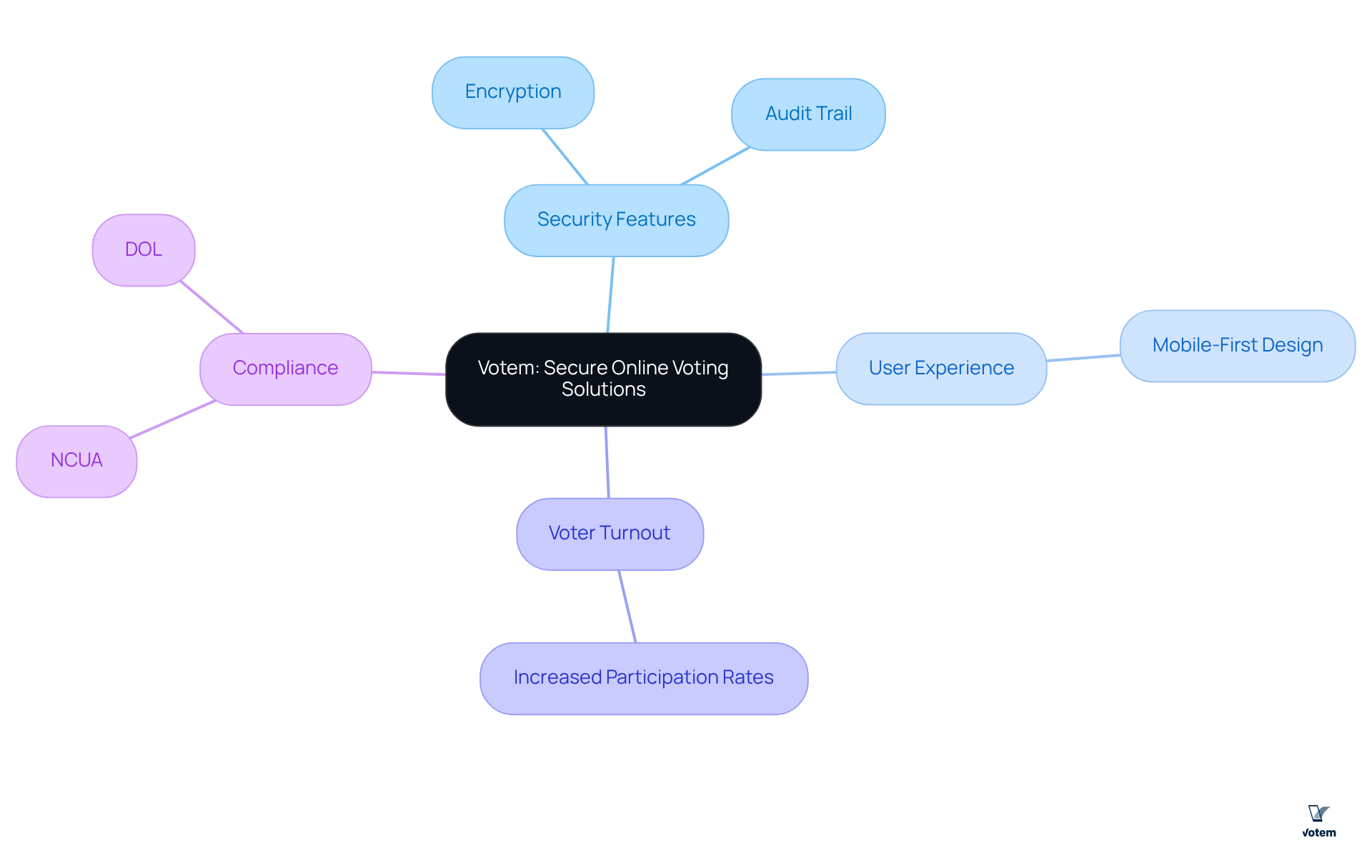
Proxy Role: Understanding the Function of Proxies in Board Meetings
Board proxies are essential mechanisms in board meetings, allowing stockholders to delegate their voting rights to another individual. This delegation is especially crucial for those unable to attend meetings in person, as it allows a board proxy to ensure their voices resonate in pivotal decisions.
Board proxies have the authority to vote on a range of matters, including board elections and significant corporate actions, thereby fostering greater participation and engagement among shareholders. Understanding the representative’s role is vital for , as it ensures that all stakeholders are represented in the decision-making process.
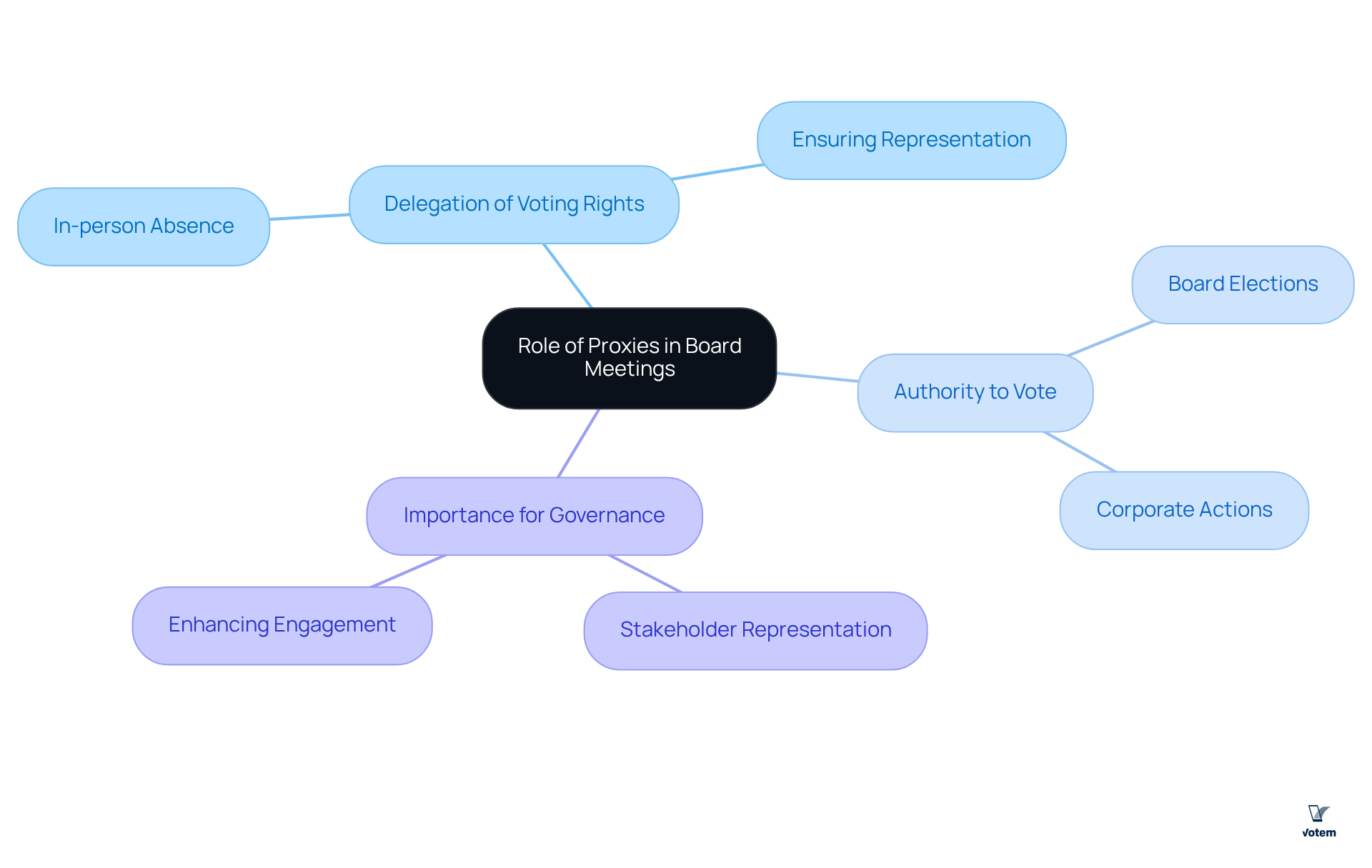
Legal Compliance: Navigating Proxy Voting Regulations and Requirements
Navigating the legal framework of representative ballot casting demands a comprehensive understanding of the rules established by the SEC and other regulatory agencies. Organizations must ensure that their representative voting processes align with these regulations to maintain transparency and accountability. This commitment involves:
- Adhering to stringent disclosure requirements
- Ensuring that proxy materials are clear and accessible
- Recognizing shareholders’ rights
By prioritizing legal compliance, entities not only cultivate trust among stakeholders but also significantly mitigate the risk of legal challenges. Strong compliance measures can simplify the election process, enhance stakeholder involvement, and ultimately contribute to more effective governance.
Votem’s CastIron platform exemplifies a robust solution that enhances accessibility, security, and transparency in elections, effectively assisting entities in navigating these intricate regulations. With features like a , Votem aids organizations in managing their polling processes efficiently, ensuring they meet quorum requirements while minimizing last-minute reminder calls. Furthermore, Votem has successfully managed over 13 million votes, showcasing its capability to handle large volumes of ballots while significantly increasing voter turnout.
As Ferrell M. Keel observes, “SB 2337 imposes significant disclosure obligations on advisory firms to provide investors with the financial rationale for their recommendations,” underscoring the critical importance of adherence in today’s regulatory environment. This highlights the necessity for union leadership to engage with these requirements actively, ensuring that their organizations remain compliant and effective in their electoral processes.
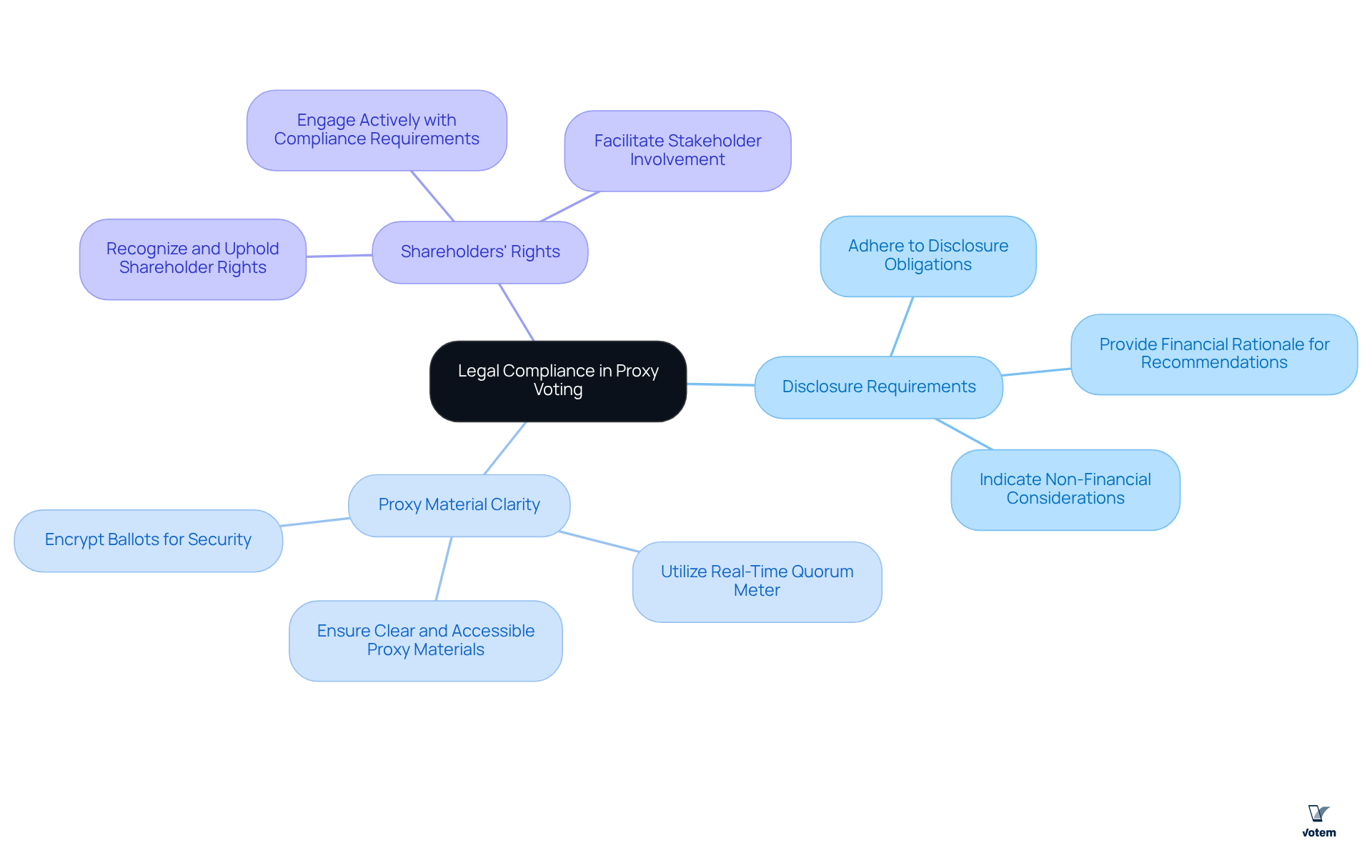
Voting Management Tools: Enhancing Proxy Voting Efficiency and Participation
Ballot management tools are essential for streamlining procedures related to board proxy, significantly enhancing efficiency and participation. These advanced platforms , providing real-time updates on participation rates while ensuring secure recording of all votes. By adopting user-friendly solutions, companies can foster greater shareholder involvement, making the balloting process more accessible. Notably, features such as mobile participation and online ballot submission have been shown to increase turnout by as much as three times on launch day, particularly with Votem’s CastIron platform, which has effectively managed over 13 million votes. Furthermore, platforms like Proxymity ensure compliance and enhance communication between issuers and investors, thereby transforming engagement strategies. As advancements in alternative voting technology for 2025 emerge, it is imperative for entities to leverage these tools to bolster governance and accountability.
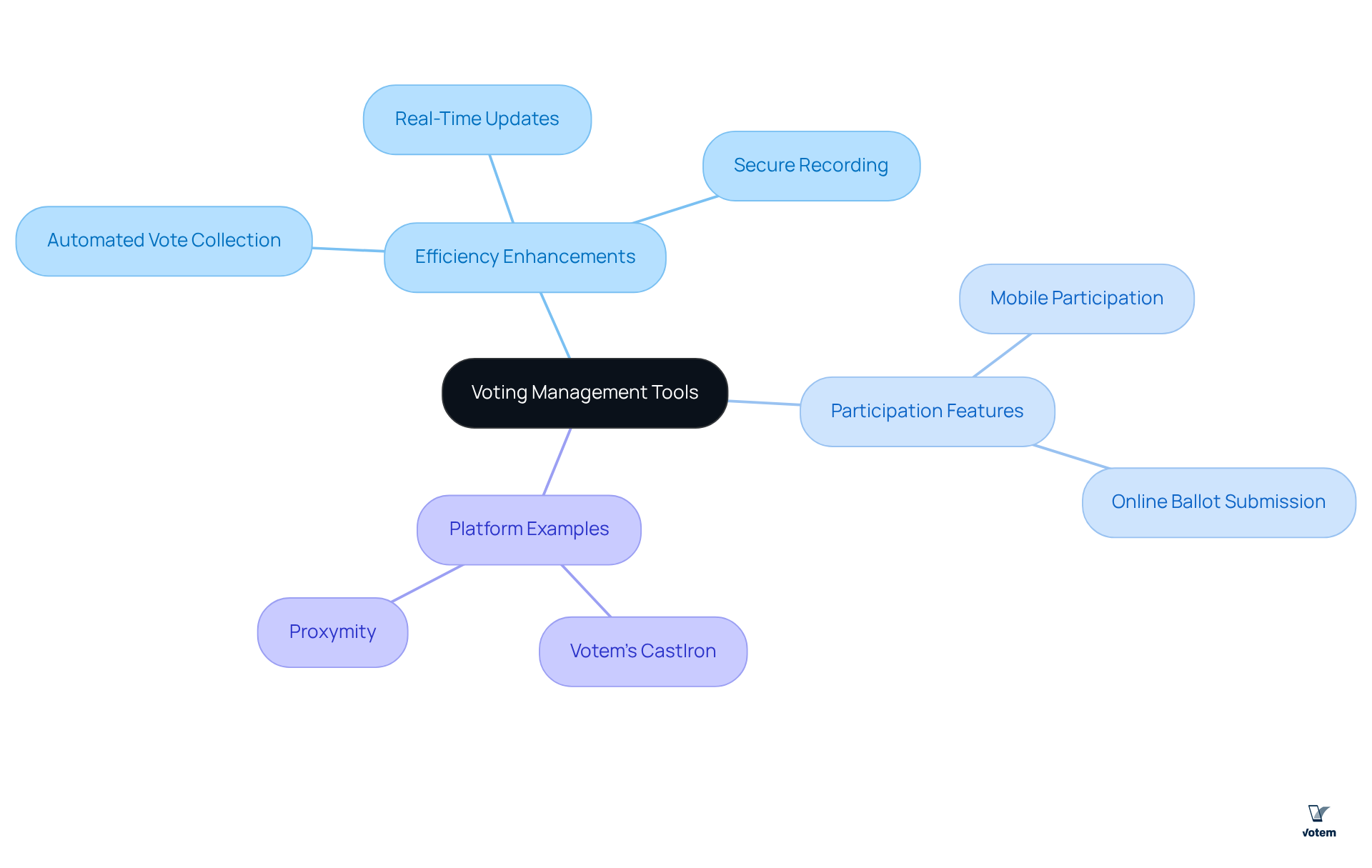
Quorum Considerations: How Proxies Impact Board Meeting Requirements
Quorum is essential for the legitimacy of board meetings, as it dictates whether decisions can be made legally. Board proxies play a crucial role in attaining quorum, particularly in groups where member attendance may be limited. By enabling shareholders to cast their votes through representatives, companies can secure the necessary number of votes, thereby promoting efficient business operations. This becomes especially critical when significant decisions are on the agenda; failing to can postpone vital actions and impede organizational progress.
For instance, the Nueces River Authority’s board meeting on February 7, 2025, lacked the required quorum of 21 total board positions, underscoring the importance of representative participation to ensure that all voices are heard. As nonprofit attorney Ellis Carter noted, ‘Board proxy ballots can assist groups by enabling absent members to cast their votes and help nonprofits achieve quorum.’ Furthermore, representative balloting not only enhances involvement but also fosters clarity and accountability within corporate governance, establishing it as an indispensable tool for entities navigating the complexities of decision-making in 2025 and beyond.
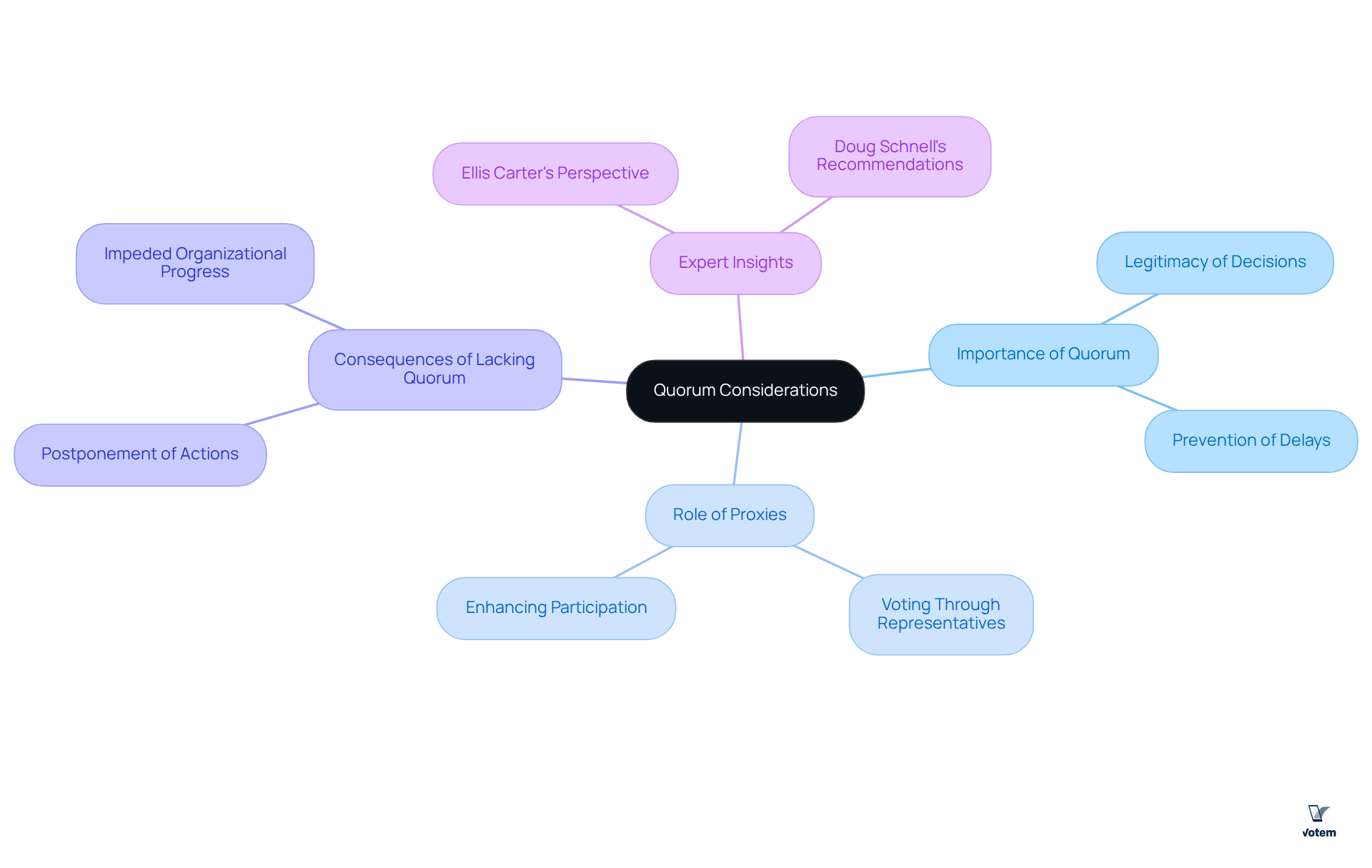
Conflict of Interest: Identifying Risks in Proxy Voting Scenarios
Conflicts of interest pose significant dangers in representative decision-making, particularly when individuals have personal stakes in the outcomes of ballots. Consider that Glass Lewis commands approximately 90% of the US shareholder-advice market, underscoring the influence of advisory firms and the urgent need to address these conflicts.
Organizations must take proactive steps to identify and mitigate these issues. This involves:
- Establishing clear rules for representative balloting using a board proxy.
- Requiring comprehensive disclosures from representatives regarding any potential conflicts.
- Ensuring that all votes align with the best interests of shareholders.
As Ferrell Keel, a partner at Jones Day, emphasizes, proxy advisors are obligated to provide clear justifications for their recommendations, particularly when they diverge from management’s stance. By addressing potential disputes head-on, organizations can preserve the integrity of the electoral process and foster trust among stakeholders.
Moreover, examining successful case studies, such as —which has effectively managed over 13 million votes while ensuring compliance and transparency—can serve as a valuable reference. Implementing these strategies not only enhances governance but also protects stakeholder interests.
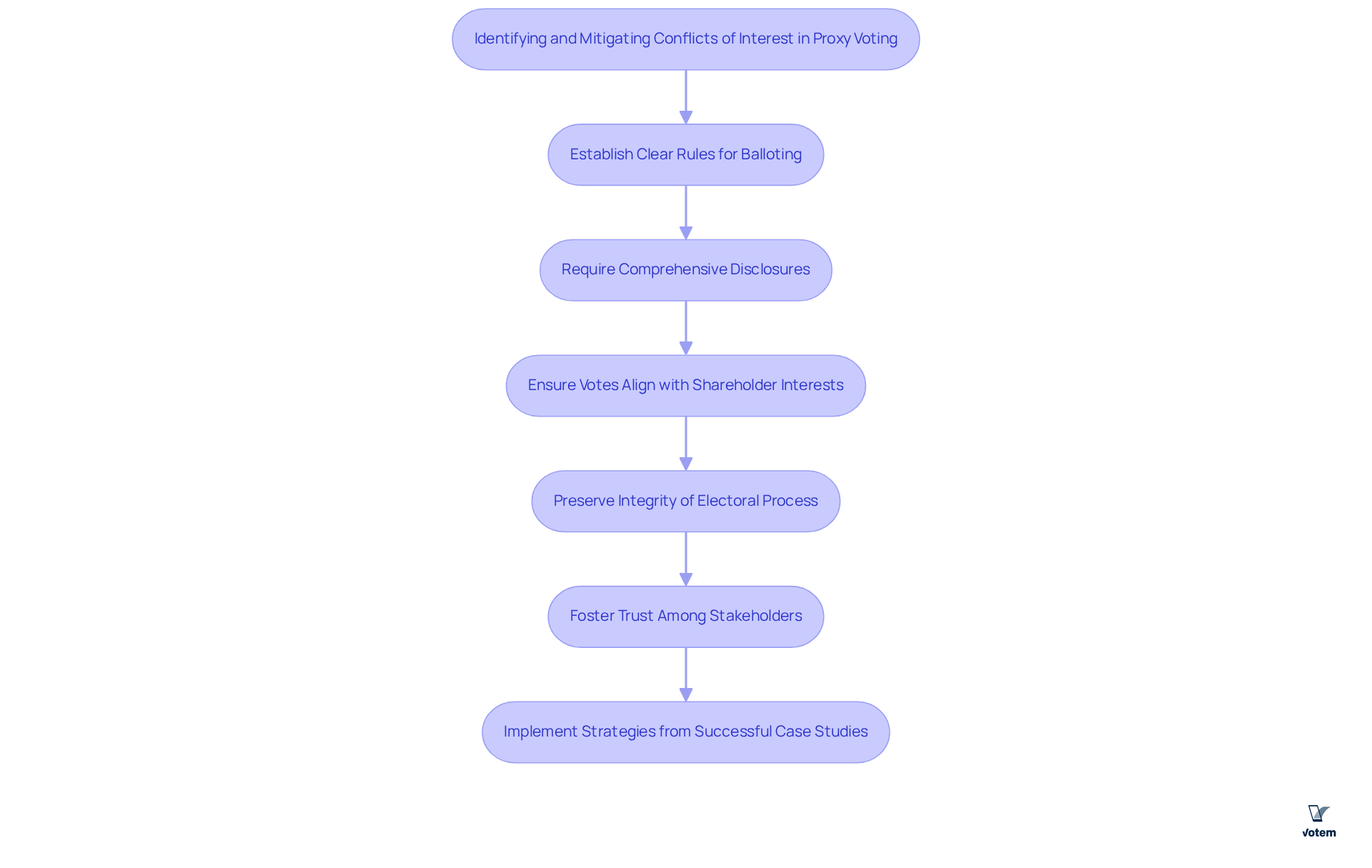
Revocation Process: Understanding How to Cancel Proxy Appointments
Cancelling a representative appointment is a vital procedure that empowers investors to reclaim control over their voting rights. This action can occur at any time before the vote is cast, and it is imperative that investors are well-informed about the procedures involved.
Typically, revocation can be accomplished by:
- Submitting a new proxy with a later date
- Providing written notice to the organization
Understanding the to ensure their preferences are accurately represented, particularly in dynamic corporate environments where situations may change rapidly.
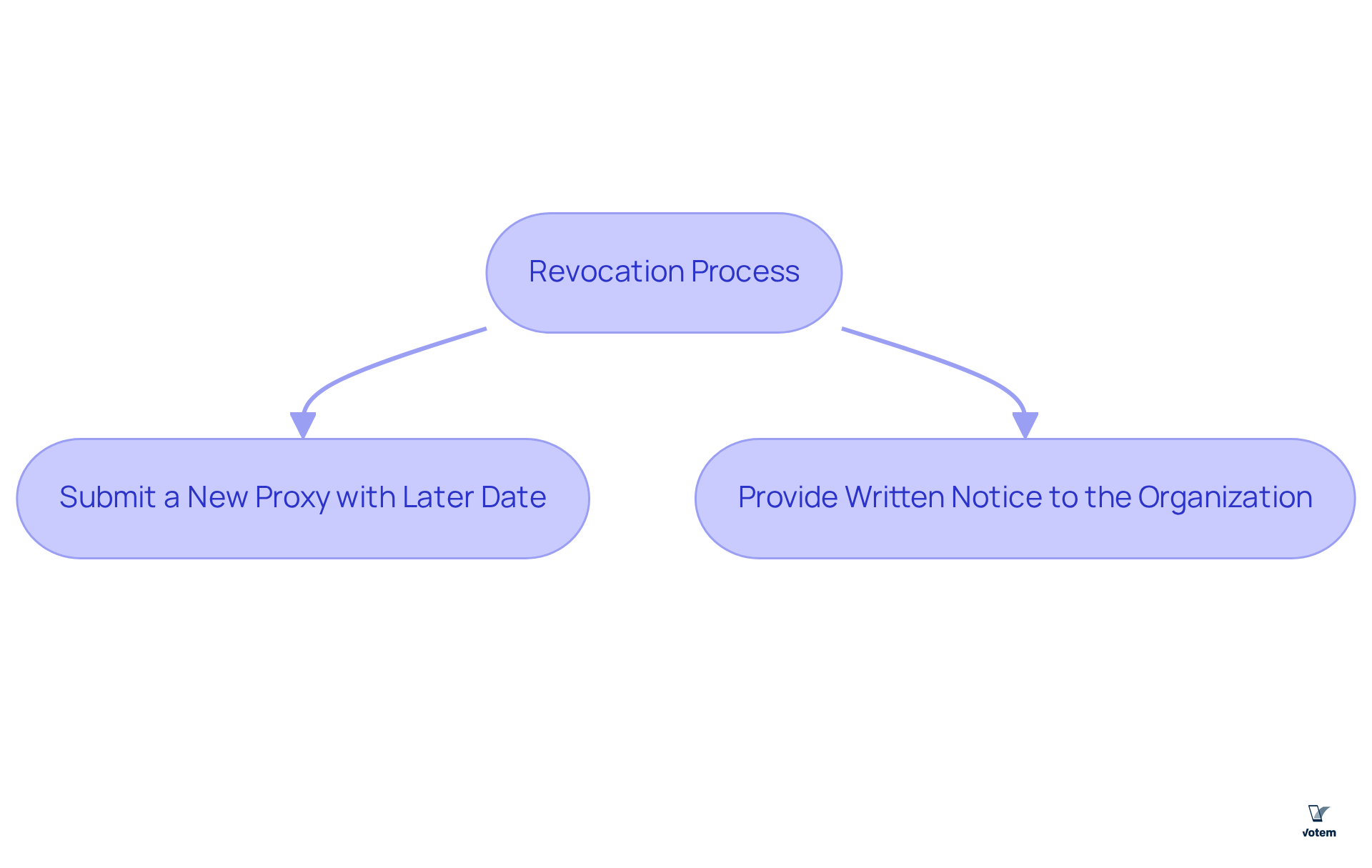
Special Considerations: Unique Factors in Proxy Voting Situations
Board proxy balloting presents distinct challenges influenced by various factors, including organizational governance structures, the nature of the issues at hand, and the demographics of the electorate. Labor unions, in particular, encounter unique hurdles, such as the necessity to engage a diverse membership base effectively. For instance, with retail investor ownership surging to nearly 32% in 2024—driven by younger investors—labor unions must adapt their strategies to resonate with this demographic shift. This shift necessitates a more inclusive strategy for board proxy participation, ensuring that the voices of younger members are heard and taken into account.
Customized methods, like utilizing technology for secure online balloting, can significantly enhance participation rates. Votem’s CastIron platform exemplifies this by allowing participation at any time and from any location while ensuring adherence to governance requirements. With a proven track record of successfully managing over 13 million votes, Votem’s platform not only but also fosters trust among voters. As Jonathan Doorley noted, “To get a deal over the finish line and positioned for post-close success in today’s landscape, companies can no longer just focus their messaging on shareholders.”
By comprehending these particular factors, organizations can create strategies that not only enhance turnout but also align the election process with their governance goals.
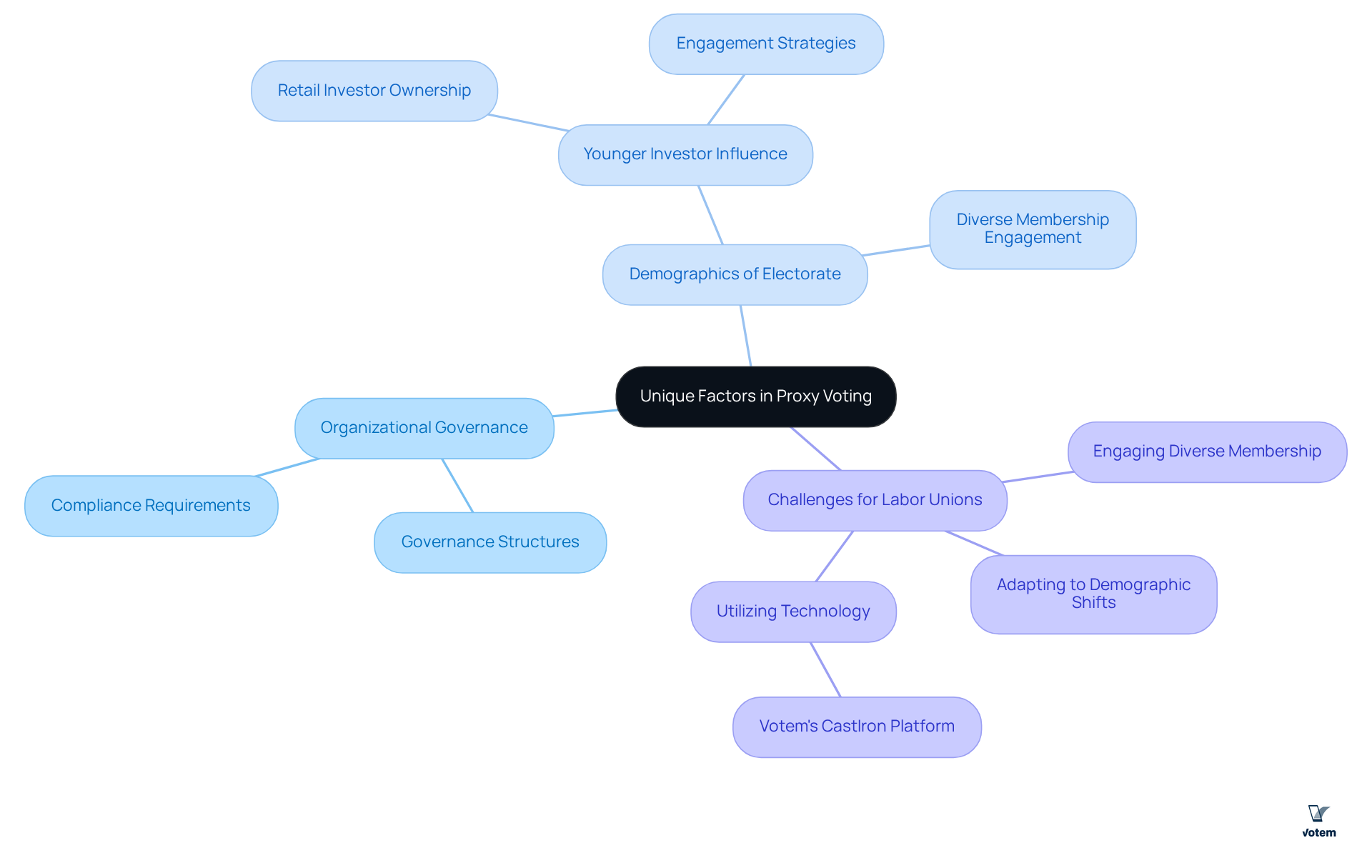
Shareholder Activism: The Growing Influence on Proxy Voting Dynamics
Shareholder activism has emerged as a formidable force in shaping voting dynamics, with investors increasingly striving to influence corporate governance and decision-making. Activists frequently employ alternative votes to advocate for changes in management, board composition, and corporate policies. This expanding influence necessitates that companies remain vigilant and responsive to stakeholder concerns; neglecting to do so can lead to contentious voting conflicts and damage to their reputation. By understanding the motivations and tactics of activist investors, organizations can better prepare for voting seasons and foster positive interactions with their stakeholders.
To effectively engage with activist shareholders, organizations should implement proactive strategies, such as:
- Establishing open communication channels
- Addressing shareholder proposals with comprehensive analyses
The recent shareholder season has witnessed a notable increase in proposals related to governance issues, particularly executive compensation, indicating a shift in investor focus. Organizations that fail to engage positively may face resistance, as evidenced by recent shareholder battles where activists successfully nominated candidates to boards, exemplified by Elliott Investment Management at Phillips 66.
Furthermore, the 2025 voting season is expected to continue the trend of heightened investor activism, with advocates increasingly zeroing in on strategic and operational decisions. This trend highlights the critical importance of understanding the motivations behind activist campaigns, which often include demands for transparency and accountability. Organizations that prioritize sound governance practices and clear disclosures are better positioned to navigate this evolving landscape.
Votem’s CastIron platform can play a pivotal role in this context, offering a that significantly enhances voter participation during alternative ballot seasons. Additionally, the platform’s robust security features, including encryption of ballots in transit and at rest, ensure compliance and bolster trust among stakeholders. As the dynamics of investor activism continue to evolve, firms must remain adaptable and prepared for ballot seasons. By recognizing the influence of activist investors and engaging with them constructively, organizations can mitigate risks and enhance their governance frameworks.
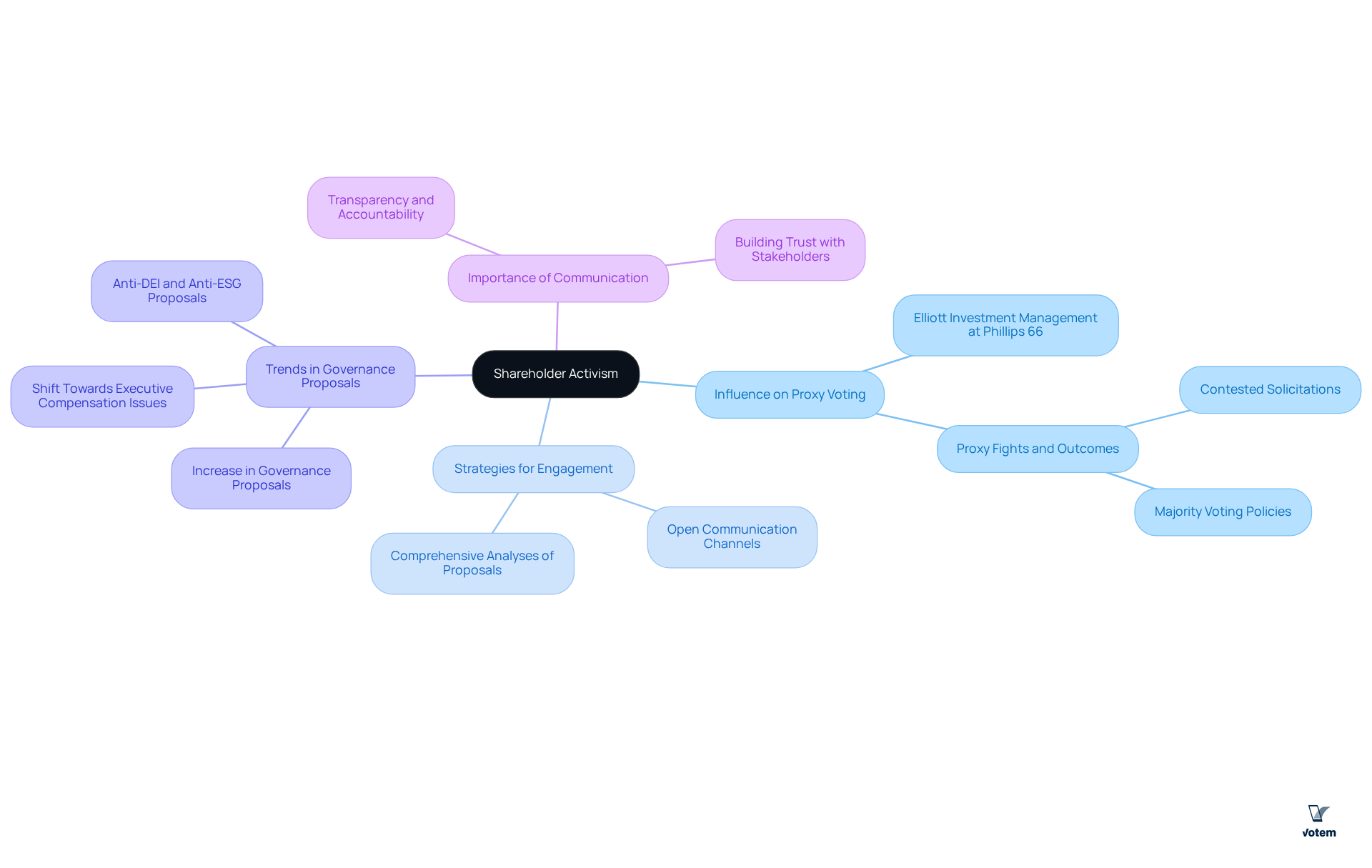
Key Takeaways: Essential Insights from the Proxy Voting Process
The representative ballot procedure is vital for efficient governance, enabling stakeholders to participate in decision-making even when they cannot attend meetings. Understanding the role of intermediaries, ensuring legal compliance, employing effective management tools for decision-making, and recognizing the impact of are key insights in this context. Notably, proxy advisory firms significantly influence investors’ choices, making it essential for organizations to cultivate strong relationships with these firms to gain insights into their recommendations. Additionally, organizations must remain vigilant regarding potential conflicts of interest and the revocation process to uphold the integrity of their voting systems.
Recent statistics reveal that average support for say-on-pay proposals soared to 90.8% in 2025, while backing for director nominees across the Russell 3000 index rose to 95.1%. Furthermore, the SEC’s recent guidance updates affecting investor proposals highlight the evolving regulatory landscape that organizations must navigate. By integrating these insights, organizations can enhance their governance practices, fostering a more engaged and informed shareholder base. This, in turn, leads to improved decision-making and accountability.
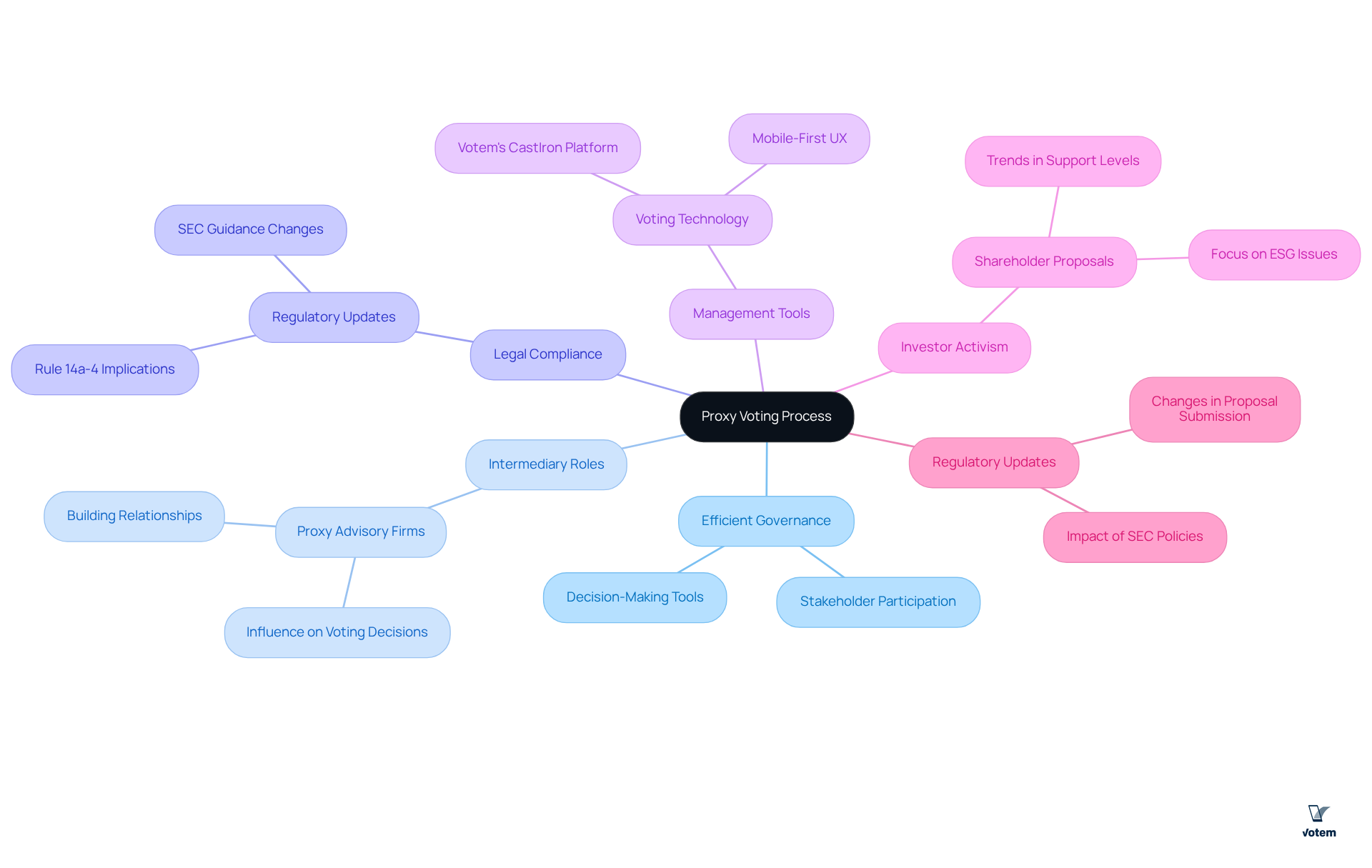
Conclusion
The insights presented on board proxy governance underscore the critical role of proxies in facilitating effective decision-making within organizations. By enabling shareholders to delegate their voting rights, proxies not only enhance participation but also ensure that diverse voices are represented in pivotal corporate actions. This mechanism is essential for maintaining a robust governance framework, particularly as organizations navigate the complexities of today’s regulatory landscape.
Key arguments throughout the article highlight the importance of secure online voting solutions, such as Votem’s CastIron platform, which enhances voter trust and participation through innovative features like real-time quorum meters and mobile accessibility. Furthermore, understanding the legal compliance requirements and managing potential conflicts of interest are crucial for organizations seeking to uphold the integrity of their electoral processes. The rise of shareholder activism further emphasizes the need for companies to engage proactively with their stakeholders to foster transparency and accountability.
In conclusion, effective governance in 2025 and beyond hinges on the strategic use of proxy voting mechanisms. Organizations are encouraged to leverage advanced voting management tools and remain vigilant about compliance to enhance shareholder engagement. By prioritizing these elements, companies can not only improve their decision-making processes but also build a more informed and involved shareholder base, ultimately driving better outcomes for all stakeholders involved.
Frequently Asked Questions
What is Votem’s CastIron platform?
Votem’s CastIron platform is a secure online voting solution designed for proxy elections, ensuring compliance with regulatory requirements and enhancing voter trust through encrypted votes and an immutable audit trail.
How does Votem improve voter turnout?
Organizations using Votem have reported significant increases in voter turnout, with some events experiencing participation rates that triple on launch day.
What features does Votem offer to enhance the voting process?
Votem offers a mobile-first user experience for ease of access, a real-time quorum meter for effective decision-making, and robust security measures to ensure compliance with regulations.
What role do board proxies play in board meetings?
Board proxies allow stockholders to delegate their voting rights to another individual, ensuring that those unable to attend meetings in person can still participate in important decisions.
What are the legal requirements for proxy voting?
Organizations must adhere to SEC regulations, which include stringent disclosure requirements, clear and accessible proxy materials, and recognition of shareholders’ rights to ensure transparency and accountability.
How does Votem assist organizations in navigating proxy voting regulations?
Votem’s CastIron platform helps organizations comply with complex regulations by enhancing accessibility, security, and transparency in elections, and by managing polling processes efficiently.
What has been Votem’s experience with managing votes?
Votem has successfully managed over 13 million votes, demonstrating its capability to handle large volumes of ballots while significantly increasing voter turnout.
List of Sources
- Votem: Secure Online Voting Solutions for Proxy Elections
- Proxymity launches Vote Connect in the North American market, bringing a breakthrough in digital proxy voting | BetaNXT (https://betanxt.com/betanxt-in-the-news/proxymity-launches-vote-connect-in-the-north-american-market-bringing-a-breakthrough-in-digital-proxy-voting)
- Votem CEO Pete Martin: Leveraging Blockchain To Secure Global Mobile Voting & Rocking The Vote | Crowdfund Insider (https://crowdfundinsider.com/2017/01/95097-votem-ceo-pete-martin-instigating-blockchain-innovation-secure-global-mobile-voting)
- Proxymity Vote Connect Suite – Proxymity (https://proxymity.io/proxymity-products/proxymity-vote-connect)
- weforum.org (https://weforum.org/stories/2024/04/what-is-electronic-voting)
- Proxy Role: Understanding the Function of Proxies in Board Meetings
- Proxy Season: What Investors Need to Know (https://investopedia.com/proxy-season-7370612)
- unpri.org (https://unpri.org/pri-blog/proxy-season-2025-exercising-shareholder-rights-remains-as-important-as-ever/13183.article)
- iss-corporate.com (https://iss-corporate.com/resources/blog/2025-u-s-proxy-season-midseason-review-finds-sharp-drop-in-shareholder-resolutions-on-ballot)
- Proxy Season Highlights Part One Shareholder and Management Proposals // Cooley // Global Law Firm (https://cooley.com/news/insight/2025/2025-07-07-proxy-season-highlights-part-one-shareholder-and-management-proposals)
- Legal Compliance: Navigating Proxy Voting Regulations and Requirements
- Texas Enacts New Law to Regulate Proxy Advisory Firms (https://jonesday.com/en/insights/2025/06/texas-enacts-new-law-to-regulate-proxy-advisory-firms)
- Proxy Advisor Pushback: Texas Sued Over Impending Regulation (https://manifest.co.uk/proxy-advisor-pushback-texas-sued-over-impending-regulation)
- New Texas Law Puts Proxy Advice Under the Microscope | JD Supra (https://jdsupra.com/legalnews/new-texas-law-puts-proxy-advice-under-9402331)
- Texas Senate Bill 2337: New Proxy Advisor Regulations Seek to Protect Shareholder Value of Texas Companies | Insights | Greenberg Traurig LLP (https://gtlaw.com/en/insights/2025/7/texas-senate-bill-2337-new-proxy-advisor-regulations-seek-to-protect-shareholder-value-of-texas-companies)
- Texas Proxy Law Faces Legal Pushback from ISS, Glass… (https://dechert.com/knowledge/onpoint/2025/7/texas-proxy-law-faces-legal-pushback-from-iss–glass–lewis.html)
- Voting Management Tools: Enhancing Proxy Voting Efficiency and Participation
- Proxymity launches Vote Connect in the North American market, bringing a breakthrough in digital proxy voting | BetaNXT (https://betanxt.com/betanxt-in-the-news/proxymity-launches-vote-connect-in-the-north-american-market-bringing-a-breakthrough-in-digital-proxy-voting)
- Navigating the proxy voting season: embracing the digital age – Proxymity (https://proxymity.io/views/navigating-the-proxy-voting-season-embracing-the-digital-age)
- Glass, Lewis & Co., LLC (https://glasslewis.com/news-release/proxymity-and-glass-lewis-join-forces-to-enhance-digital-voting-efficiency-for-institutional-investors)
- broadridge.com (https://broadridge.com/article/bbd/proxy-voting-trends-to-watch-in-2025)
- Quorum Considerations: How Proxies Impact Board Meeting Requirements
- boardeffect.com (https://boardeffect.com/blog/board-meeting-proxy)
- Proxy vote meaning: Complete guide to proxy voting (https://diligent.com/resources/blog/proxy-voting-guidelines)
- QUORUMS, PROXIES, AND THE MYSTERIES OF ANNUAL MEETINGS – NS Property Management (https://nsmanagement.net/quorums-proxies-and-the-mysteries-of-annual-meetings)
- Nueces River Authority faces quorum controversy in recent board meeting (https://kristv.com/news/local-news/in-your-neighborhood/corpus-christi/nueces-river-authority-faces-quorum-controversy-in-recent-board-meeting)
- Applied Optoelectronics alters stockholder meeting quorum By Investing.com (https://investing.com/news/sec-filings/applied-optoelectronics-alters-stockholder-meeting-quorum-93CH-3962794)
- Conflict of Interest: Identifying Risks in Proxy Voting Scenarios
- House subcommittee addresses proxy advisory firms – Ballotpedia News (https://news.ballotpedia.org/2025/05/06/house-subcommittee-addresses-proxy-advisory-firms)
- Texas Enacts New Law to Regulate Proxy Advisory Firms (https://corpgov.law.harvard.edu/2025/07/13/texas-enacts-new-law-to-regulate-proxy-advisory-firms)
- U.S. Rep. Fitzgerald: Introduces bill to stop proxy advisors from imposing ESG on U.S. companies (https://wispolitics.com/2025/u-s-rep-fitzgerald-introduces-bill-to-stop-proxy-advisors-from-imposing-esg-on-u-s-companies)
- Revocation Process: Understanding How to Cancel Proxy Appointments
- The Latest Proxy Season Stats (& Expectations for ’25) | JD Supra (https://jdsupra.com/legalnews/the-latest-proxy-season-stats-2350529)
- How Can a Health Care Proxy Be Revoked in New York State? (https://tullyelderlaw.com/blog/how-can-a-health-care-proxy-be-revoked-in-new-york-state)
- Pebblebrook Hotel Trust files 8-K referencing Q2 2025 results (https://stocktitan.net/sec-filings/UPXI/pre-14a-upexi-inc-preliminary-proxy-statement-0810b59d5ab6.html)
- Specific Rules Must Be Followed – Voting by Proxy (https://cooperatornews.com/article/voting-by-proxy)
- Special Considerations: Unique Factors in Proxy Voting Situations
- House GOP Opens Probe Into Unions’ Proxy-Voting Activities (https://news.bloomberglaw.com/esg/house-gop-opens-probe-into-unions-proxy-voting-activities)
- How unions are fighting a boardroom battle at Starbucks (https://ft.com/content/08c00024-3dc7-4d48-9dcd-670f93016973)
- Proxy Voting Statistics & Trends (https://connect.societycorpgov.org/blogs/randi-morrison/2024/10/02/proxy-voting-statistics-trends)
- Unions Seek Influence in Corporate Battles (https://corpgov.law.harvard.edu/2024/06/05/unions-seek-influence-in-corporate-battles)
- Shareholder Activism: The Growing Influence on Proxy Voting Dynamics
- Fewer Campaigns, but Much to Observe from the 2025 Proxy Season | Enhanced Scrutiny (https://ma-litigation.sidley.com/2025/06/fewer-campaigns-but-much-to-observe-from-the-2025-proxy-season)
- Shareholder Activism Developments in the 2025 Proxy Season (https://corpgov.law.harvard.edu/2025/06/18/shareholder-activism-developments-in-the-2025-proxy-season)
- New Policy Landscape Turbocharges DEI & ESG Activism in 2025 Proxy Season (https://conference-board.org/press/2025-proxy-season-preview)
- Investors stopped from voting on 23% of shareholder proposals at US firms (https://ipe.com/news/investors-stopped-from-voting-on-23-of-shareholder-proposals-at-us-firms/10131268.article)
- Key Takeaways: Essential Insights from the Proxy Voting Process
- unpri.org (https://unpri.org/pri-blog/proxy-season-2025-exercising-shareholder-rights-remains-as-important-as-ever/13183.article)
- proxymity.io (https://proxymity.io/views/decoding-proxy-season)
- Proxy Season Highlights Part One Shareholder and Management Proposals // Cooley // Global Law Firm (https://cooley.com/news/insight/2025/2025-07-07-proxy-season-highlights-part-one-shareholder-and-management-proposals)
- Navigating the 2025 Proxy Season: Six Key Developments to Watch (https://paulweiss.com/insights/client-memos/navigating-the-2025-proxy-season-six-key-developments-to-watch)
- 2025 Proxy Season Preview (https://corpgov.law.harvard.edu/2025/03/10/2025-proxy-season-preview)

